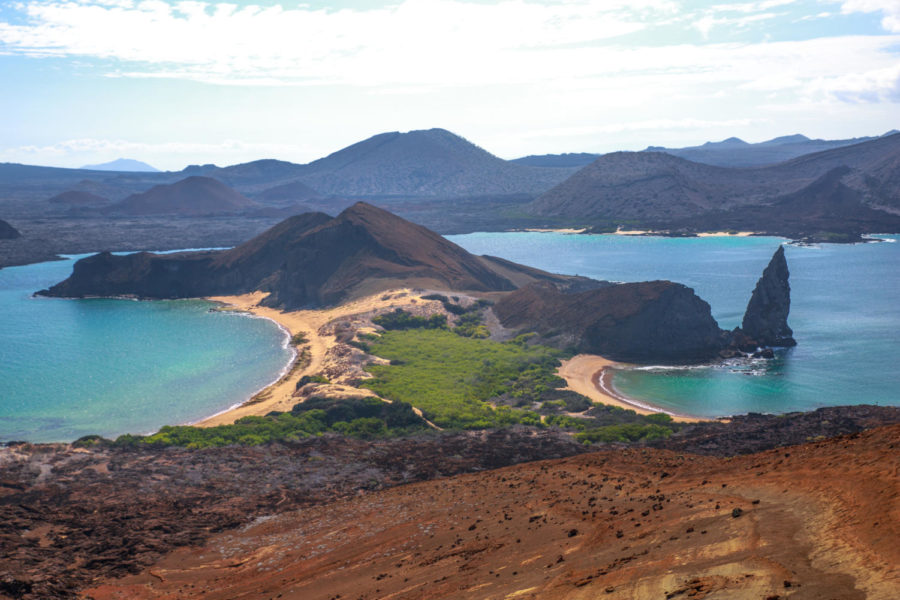Editorial: Overfishing could destroy the Galapagos Islands
The Galapagos Islands are one of the most biologically diverse places in the world and they are in danger.
September 10, 2020
Extinction: one of humanity’s favorite gifts to bestow upon our animal neighbors. Whether it is through deforestation, aggressive hunting, poaching or overfishing, we love to add to the slaughter.
The most recent of humanity’s terrible activities comes with the giant Chinese fishing fleet located near the Galapagos Islands. The islands, which lie some 620 miles from Ecuador’s coast, are home to many unique species — including giant tortoises — and served as inspiration for 19th century British scientist Charles Darwin’s theory of evolution.
Around the globe, many kinds of fish and sea creatures are disappearing at an unsustainable rate due to climate change, overfishing and illegal fishing by industrial fleets like the one being operated by Chinese fishermen. The Galapagos Islands could be the next victim of these terrible fleets if no one steps in to intervene.
Satellite data from ABC News indicated that a large portion of the Chinese fishing fleet remained in international waters near the archipelago at the beginning of this month, even as China said it would temporarily ban fishing near the UNESCO world heritage site.
Vessel tracking data displayed on the public map created by Global Fishing Watch, a group that tracks commercial fishing vessels, showed the fleet was massed until at least Sept. 1 along the southern border of the exclusive economic zone around the Galapagos, which extends 200 nautical miles from the islands, according to ABC News.
That is roughly where the fleet, estimated at several hundred vessels, had been since June, escalating concerns about overfishing and the threat to vulnerable marine species in the nutrient-rich waters around the archipelago.
A total of 340 vessels were recorded in the area in August, the Ecuadorian navy said, compared with some 260 reported in July. Of the vessels, 243 are flagged to China, including to companies with suspected records of illegal, unreported and unregulated, or IUU, fishing, according to research by C4ADS, a data analysis nongovernmental organization.
Most of the fleet’s vessels are trawlers, which are banned within China’s territorial waters and notorious for damaging ecosystems by dragging nets along the seafloor. Other common boats are longliners, for larger fish such as tuna or shark, and squid jiggers, which usually operate in deeper waters, as well as refrigerated container ships to store enormous catches.
Transferring cargo between vessels is prohibited under international maritime law, yet the Chinese flotilla has supply and storage ships along with longline and squid fishing boats.
One captain of an Ecuadorian tuna boat saw the Chinese fishing boats up close in early July, before the end of the tuna season.
“They just pull up everything!” the captain said, who asked not to be named. “We are obliged to take a biologist aboard who checks our haul; if we catch a shark we have to put it back, but who controls them?”
The Chinese fishing fleet has appeared near the Galapagos for years, though the latest flotilla is among the biggest. Even if a fishing moratorium is implemented, conservationists say long-term pressure on marine life around the archipelago will only increase.
“This is the fourth year in a row that this has happened. They are coming here because the area is extremely rich in fish due to the confluence of ocean currents,” Luis Suárez, director of the Ecuadorian conservation nongovernmental organization “Conservación Internacional Ecuador,” told Deutsche Welle (DW), a German media outlet.
This means Chinese ships have been raiding the waters near the archipelago for a long time now and who knows how many sea animals they have killed.
The Galapagos Islands are a beautiful example of the wonders of evolution and life on Earth, we cannot let it be destroyed for the sake of a bowl of shark fin soup or because the possibility of a bigger haul of fish is better there.
In China, experts say there is no danger of overfishing near the Galapagos. Wang Yamin, an expert on fishing at Shandong University, told DW there is no danger of overfishing in the region.
“A flotilla of 260 boats should not be concerning, because there are really very large fish stocks there,” Yamin said.
Marine biologist Cesar Penaherrera doesn’t agree. “We don’t know what these fishing fleets are really up to, and we don’t know how much they fish,” he told DW. “We only know that it is a large number of ships. And they catch fish and squid that are transported to other boats that they then bring to port.”
Penaherrera, director of MigraMar, an international network of scientists studying ocean life in the eastern Pacific, is concerned overfishing risks the collapse of the fish population in the waters around the Galapagos.
And his concerns are not unfounded, because Chinese fishermen have went into Galapagos waters before, all for some shark fins.
In 2017, Ecuador’s navy seized the Chinese reefer Fu Yuan Yu Leng 999 within the Galápagos marine reserve. Inside its containers were 6,000 frozen sharks — including the endangered hammerhead shark and whale shark.
“It was a slaughterhouse,” said Jonathan Green, a researcher who recently lost track of a whale shark he was tracking in the Galapagos region. “This kind of slaughter is going on on a massive scale in international waters and nobody is witnessing it.”
The seizure prompted protests outside the Chinese embassy in Quito, Ecuador, and Ecuador fined the vessel $6 million and the 20 Chinese crew members were later jailed for up to four years for illegal fishing.
Green said the “explosion of life” created by the confluence of cold and warm ocean currents around the Galápagos Islands is exactly why the Chinese armada is hovering around the archipelago’s waters.
“The Galápagos marine reserve is a place of very great productivity, high biomass but also biodiversity,” Green said. The longline fishing technique used by the fleet catch big fish like tuna, but also sharks, rays, turtles and marine mammals like sea lions and dolphins, he added.
The fact that most Chinese distant water ships are so large they scoop up as many fish in one week as local boats from Senegal or Mexico might catch in a year is so disturbing and horrifying it is surprising there is any fish left.
This is evident when you look at the fact that many of the fishing stocks closest to China’s shores have collapsed from overfishing and industrialization. What ecosystem are they planning on destroying next?
“This is not fishing anymore, it is simply destroying the resources of our oceans,” Green said. “We should ask whether any nation on this planet has the right to destroy what is common ground.”
What Green brings up is important: how can one nation just decide to destroy ecosystems and get away with it? How can humanity?
We only have one Earth and the biodiversity on it is the only one we have, at this time there is no way for us to clone a species before we drive it to extinction so we need to put a stop to this rampage of extinction before it claims everything. Once we have killed everything besides us, we die too.

















